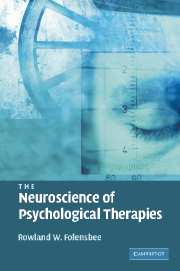Book contents
- Frontmatter
- Contents
- Acknowledgements
- 1 Introduction
- Part 1 Basic concepts
- Part 2 The process of psychotherapy
- 10 Introduction to neuroscience applications in psychotherapy
- 11 Intake and assessment
- 12 Neural networks in therapy
- 13 Affect in therapy
- 14 Memory and change
- 15 Anxiety and change
- 16 The experience of improvement in psychotherapy
- 17 The therapist's neuroscience
- 18 Communicating with clients through neuroscience
- 19 Integrating traditional therapies
- 20 Applying neuroscience to depression intervention
- 21 Neuroscience and psychotherapy: moving forward
- Appendix: Neuroimaging and psychological therapies
- References
- Index
13 - Affect in therapy
Published online by Cambridge University Press: 15 December 2009
- Frontmatter
- Contents
- Acknowledgements
- 1 Introduction
- Part 1 Basic concepts
- Part 2 The process of psychotherapy
- 10 Introduction to neuroscience applications in psychotherapy
- 11 Intake and assessment
- 12 Neural networks in therapy
- 13 Affect in therapy
- 14 Memory and change
- 15 Anxiety and change
- 16 The experience of improvement in psychotherapy
- 17 The therapist's neuroscience
- 18 Communicating with clients through neuroscience
- 19 Integrating traditional therapies
- 20 Applying neuroscience to depression intervention
- 21 Neuroscience and psychotherapy: moving forward
- Appendix: Neuroimaging and psychological therapies
- References
- Index
Summary
Emotions are particularly potent elements of neural networks. They have a central role in therapists' brain-based conceptualizations during therapy while also serving as a valuable focus during discussions with clients. Concepts related to emotions in personal functioning were outlined in Chapter 5. These concepts can be applied by clinicians throughout the process of therapy. The present chapter addresses how such applications unfold during therapy and emphasizes how such understanding can be shared with clients.
Clinical observations suggest that clients often feel threatened by the intensity, unpredictability, and uncontrollability of emotions. Clients often feel weak and inadequate simply because they are experiencing emotions, and they often sense that something is wrong with them for having strong emotional reactions. There seems to be a tendency for clients to perceive that emotions are synonymous with the self, and as a result, when emotions are negative or unacceptable, clients become convinced, or at least suspicious, that their inner core is unacceptable. Clients express particular distress when their emotions do not match the declaratively developed conscious value system to which the individual client adheres. The client experiences his inner self as being incongruent with what he wants his self to be.
Explicit discussion of the nature and likely evolutionary function of emotions can allow clients to accept emotions and then both use and manage them more effectively. Explaining the important role of emotions in the activation of neural networks seems particularly useful in such discussion.
- Type
- Chapter
- Information
- The Neuroscience of Psychological Therapies , pp. 107 - 116Publisher: Cambridge University PressPrint publication year: 2007



